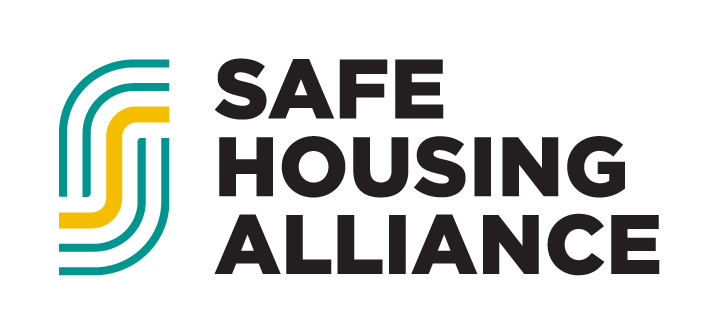Healing Starts at Home: Reimagining Permanent Supportive Housing for Trauma Survivors
Despite previous research showing that more than one-third (38%) of domestic violence survivors experience homelessness at some point in their lives, there has remained a dearth of public guidance on housing solutions that meet their specific needs.
To remedy this gap, the Downtown Women’s Center and the Safe Housing Alliance partnered to develop a Toolkit and accompanying trainings as best-practice resources for housing developers, property managers, and service providers involved in building and operating Permanent Supportive Housing (PSH) for survivors of domestic violence (DV).
 Creating Permanent Supportive Housing to Meet the Needs of Survivors of Domestic Violence:
Creating Permanent Supportive Housing to Meet the Needs of Survivors of Domestic Violence:
A Toolkit for Housing Developers, Architects, Property Managers, and Housing Service Providers
This Toolkit was made possible thanks to the expertise and insight of community partners and survivors of domestic violence and homelessness. Financial support was provided by the Conrad N. Hilton Foundation and the Blue Shield of California Foundation.
View Toolkit
Toolkit Training
Explore training materials that cover an overview of the Toolkit and its history, along with a deep dive into several of its topics.
Toolkit Overview
Intersectionality and
Racial Equity for Survivors in
Permanent Supportive Housing
Legal Housing Protections and Property Management Models for Survivors in Permanent Supportive Housing
Trauma Informed Care in Architecture and Operations Design for Permanent Supportive Housing
Toolkit Overview
To kick off the Toolkit’s launch, the Downtown Women’s Center and the Safe Housing Alliance hosted a special panel discussion of key trends and needs in the field.
The program includes an overview of key insights from the Toolkit on pathways for developing more inclusive, trauma-informed housing programs that advance survivor healing and empowerment, based on the perspectives of housing developers, architects, property managers, service providers, and survivors across the country.
Materials:
- Domestic Violence & Homeless Services Coalition
- Understanding the Cycle of Housing Insecurity for Marginalized Survivors of Domestic and Sexual Violence
- FreeFrom
- Report & Recommendations of LAHSA Ad Hoc Committee on Women Experiencing Homelessness
- Report & Recommendations of LAHSA Ad Hoc Committee on Black People Experiencing Homelessness
- Downtown Women’s Center
- Corporation for Supportive Housing
Legal Housing Protections and Property Management Models for Survivors in Permanent Supportive Housing
Federal, state, and local laws provide housing rights for survivors of domestic violence, sexual assault, dating violence, and stalking. In some states and localities those protections extend to human trafficking survivors. Permanent Supportive Housing program operators and any organization administering PSH funds must be aware of these protections and remain in compliance with them to promote the safety of survivors, program staff, and other program participants. This also brings into focus the role of property management (PM) in PSH programs to ensure Violence Against Women’s Act compliance, along with other policies and regulations, to promote a safe and well-functioning housing facility.
This webinar provides an overview of key federal, state, and local housing protections that apply to survivors living in PSH and examples of practical applications of these housing rights, particularly as it relates to property management’s role. The strengths and challenges to various PM models, and the interaction between program and PM staff to promote trauma-informed interactions with survivors will be discussed. Gain insight into housing rights, learn how a HUD-Continuum of Care has implemented a VAWA Emergency Transfer Plan policy, and how a PSH program and PM staff can support survivors through these housing protections. A PSH resident also shares personal experience regarding the impact of these policies and procedures through their lived experiences.
Materials:
Intersectionality and Racial Equity for Survivors in Permanent Supportive Housing
Historical socioeconomic disparities along race, gender, and class lines contribute to the unique barriers some communities face in accessing services and achieving personal stability and improved economic status. The disparate rates at which underrepresented groups and BIPOC (Black, Indigenous, People of Color) experience crime, violence, incarceration, non-communicable disease, un/underemployment, housing insecurity, and homelessness are also increasingly understood within the nexus of systemic dispossession. To build and run effective PSH for survivors of domestic violence (DV), operators must be aware of and actively incorporate knowledge of such dynamics into their service provision approach.
This training offers key recommendations for doing so. It draws heavily on the frameworks of intersectionality, anti-racism, and cultural humility, each of which are integral to the trauma-informed approaches to service provision. Gain insight into research about systemic anti-Black inequities in LA’s PSH and initiatives in PSH being developed to improve the outcomes for BIPOC residents.
Materials:
- Webinar slides
- Full infographic video: The Intersections Between Domestic and Sexual Violence, Racism, and Homelessness
Trauma Informed Care in Architecture and Operations Design for Permanent Supportive Housing
Permanent Supportive Housing (PSH) that effectively incorporates trauma-informed design and safety elements into its physical layout and operations can promote and increase healing for survivors of domestic violence. Learn about best practice guidance on architectural design in PSH spaces that address the unique barriers and needs survivors face in achieving housing and personal stability. This panel features models of how to ensure resident voice is central to the physical design and operations of low-income housing to create trauma-informed community. Panelists both discuss and model techniques for reimagining housing that are grounded in creativity, equity, and resilience.
